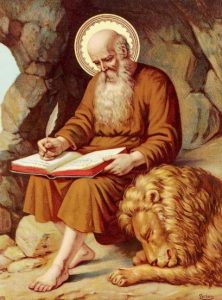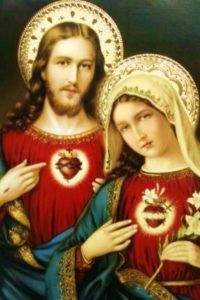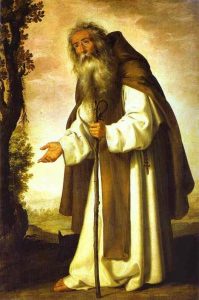 Smoke of Satan in the Church – Part 4
Smoke of Satan in the Church – Part 4
In the beginning was the Word, and the Word was with God, and the Word was God. He was in the beginning with God. All things came to be through him, and without him nothing came to be. What came to be through him was life, and this life was the light of the human race; the light shines in the darkness, and the darkness has not overcome it. (John 1:1-5)
On the evening of Thursday, June 29th, 1972, on the Solemnity of Saints Peter and Paul, in the presence of a considerable multitude of the faithful coming from every part of the world, the Holy Father celebrated the Mass and the beginning of the tenth year of his Pontificate as the successor of Saint Peter.
In His Homily referring to the situation of the Church today, the Holy Father affirms that he has a sense that “from some fissure the smoke of Satan has entered the temple of God.”
The Smoke of the Satan is distorting the teachings of the Church.
On the first of September, 1910 in a Motu Proprio entitled Sacrorum Antistitum Pope Pius X issued the oath against modernism. It mandated that “all clergy, pastors, confessors, preachers, religious superiors, and professors in philosophical-theological seminaries” of the Catholic Church swear to it. This oath against modernism was a reaction to massive changes forced on society by sophisticated elites following the call of poet Ezra Pound to “Make it new!” and guided by philosophers such as Kant and Bergson, Friedrich Nietzsche, political scientists like Karl Marx, and biologist Charles Darwin etc.
Changes in every aspect of life: philosophy, economics, political environments, social structures, sciences, architecture, literature, fashion, music, arts, everyday activities, and religious faith, in order to replace any of its traditional forms.
Philosophers attempted to synthesize the vocabularies, epistemologies, metaphysics and other features of certain modern systems of philosophy with Catholicism in much the same way as the Scholastic order had earlier attempted to synthesize Platonic and Aristotelian philosophy with the Church’s teaching.
Modernism may be described under the following broad headings as a rationalistic approach to the Bible. The rationalism that was characteristic of the Enlightenment took a pro-materialistic view of miracles and of the historicity of biblical narratives. The final overall teaching of modernism is that dogmata (the teachings of the Church, which its members are required to believe) can evolve over time – not only in their expression but also in their substance – rather than remaining the same in substance for all time.
“I don’t fear God, I love God!”
In Sacred Scripture, the Church constantly finds her nourishment and her strength, for she welcomes it not as a human word, “but as what it really is, the word of God.” “In the sacred books, the Father who is in heaven comes lovingly to meet his children, and talks with them.” (Catechism of the Catholic Church, part one- 104)
Everybody who has studied the lives and teachings of the Fathers, Doctors and Saints of the Catholic Church, must admit their enormous respect for Holy Scripture. They recognize the unity of God and God’s word, they know that God’s Word is one with God, and shouldn’t be taken lightly.
Now one of the criminals hanging there reviled Jesus, saying, “Are you not the Messiah? Save yourself and us.” The other, however, rebuking him, said in reply, “Have you no fear of God, for you are subject to the same condemnation? And indeed, we have been condemned justly, for the sentence we received corresponds to our crimes, but this man has done nothing criminal.” (Luke 23:39-41)
In Holy Scripture fear of God, or fear of the Lord appears over a hundred times, the Catholic Church counts fear of the Lord as one of the seven gifts of the Holy Spirit. Writing in the Catholic Encyclopedia, Jacques Forget explains that this gift “fills us with a sovereign respect for God, and makes us dread, above all things, to offend Him.”
St. John Vianney for many years guided by fear of the God would recite the words: “My God, make me suffer whatsoever you wish to inflict on me, but grant that I may not fall into hell.”
“I would rather die than go to Hell” was the response of Christian children in the Middle East, asked to convert to Islam by their executioners from ISIS.
Today by many fear of the Lord is describe as “The feeling of amazement before God, who is all-present, and whose friendship we do not want to lose.” Jon Mallon the contributing editor in an article published in Inside the Vatican magazine an April 2006, writes that the “fear” in “fear of the Lord” is often misinterpreted as “servile fear” (the fear of getting in trouble) when it should be understood as “filial fear” – the fear of offending someone whom one loves.
How nice, but there is one problem, God didn’t put in to Holy Scripture that He “likes those who have feelings of amazement” before Him, or experience “filial fear” of Him. He used the simple term: Fear of God. The convicted criminal hanging on the cross next to Our Lord wasn’t talking about losing friendship, or offending someone whom one loves. He was talking about real fear, Fear of the Almighty, All-powerful, creator of the world, the just God, who rewards good and punishes evil.
If we truly believe in God – the creator of everything, then we must recognize that fear comes from God too.
Fear is an extremely important motivator in our everyday life. Fear of pain prevents us from harming ourselves, fear of losing the means to support ourselves motivates us to work, fear of punishment keeps us from trouble, etc.
The Fear of God is the greatest and most beneficial of all fears, because it is based on faith, on believing in God.
In the Lord’s Prayer we are calling to God, as our Father and we are His children. To better comprehend the importance of fearing God we can look at it in the context of the relationship between a parent and child.
From the time of birth the parent will prepare their child for adult life. In this process a caring parent will have to, in one way or another, punish the child for misconduct. Fear of punishment is a motivator for the child to get to know the parent, and to understand them in order to avoid future punishments. The Book of Proverbs 9:10 summarizes it in the words: “The beginning of wisdom is fear of the LORD, and knowledge of the Holy One is understanding.”
As fearing a parent is an important part of the process of growing into adulthood, the fear of the LORD is training for wisdom, and humility goes before honors (Proverbs 15:33) is important to grow in faith.
Over the time, when a child recognizes that punishment comes out of the consideration of a loving parent, slowly this fear will turn to admiration and love. One of the forms of the Act of Contrition reflects beautifully this transition:
O my God, I am heartily sorry for having offended Thee, and I detest all my sins, because I dread the loss of heaven, and the pains of hell; but most of all because they offend Thee, my God, Who are all good and deserving of all my love. I firmly resolve, with the help of Thy grace, to confess my sins, to do penance, and to amend my life. Amen.
Fear of losing heaven, and the pains of hell is the foundation on which gratitude and love for God is build.
The idea of mercy above justice as propagated today by many, which is supposedly based on the revelations chronicled in the Diary of Saint Maria Faustina Kowalska: Divine Mercy in My Soul, diminishes the importance of fearing God. But if we read whole diary, we will find under #741 an extremely important message:
Today, I was led by an Angel to the chasms of hell. It is a place of great torture; how awesomely large and extensive it is! The kinds of tortures I saw: the first torture that constitutes hell is the loss of God; the second is perpetual remorse of conscience; the third is that one’s condition will never change; the fourth is the fire that will penetrate the soul without destroying it – a terrible suffering, since it is purely spiritual fire, lit by God’s anger; the fifth torture is continual darkness and a terrible suffocating smell, and despite the darkness, the devils and the souls of the damned see each other and all the evil, both of others and their own; the sixth torture is the constant company of Satan; the seventh torture is horrible despair, hatred of God, vile words, curses and blasphemies. These are the tortures suffered by all the damned together, but that is not the end of the sufferings. There are special tortures destined for particular souls. These are the torments of the senses. Each soul undergoes terrible and indescribable sufferings, related to the manner in which it has sinned. There are caverns and pits of torture where one form of agony differs from another. I would have died at the very sight of these tortures if the omnipotence of God had not supported me. Let the sinner know that he will be tortured throughout all eternity, in those senses which he made use of to sin.
I am writing this at the command of God, so that no soul may find an excuse by saying there is no hell, or that nobody has ever been there, and so no one can say what it is like.
Tell sinful souls not to be afraid to approach Me; speak to them of My great mercy. (Diary 1396)
In the diary of St. Faustina Our Lord is offering to us mercy in one hand, and condemnation and suffering in hell, in the other. It is a good-cop, bad-cop scenario, combining both negative with positive motivation to guide us towards good.
If we will think about our lives as a constant struggle through salvation, as a spiritual war that we are in the center of, we will reach the conclusion that ignoring, or minimalizing the importance of our Fear of God is a trap of the devil. Lack of fear of God influences our decisions and our actions. Poemen, one of the desert fathers, an early Christian monk living in the deserts of Egypt, noticed the importance of fear of God and expressed it in words, “They smoke out bees in order to steal their honey. So idleness drives the fear of God from the soul, and steals its good works.”
Protestants, by breaking from the Catholic Church, abandoned a lot of Her teachings, and by rejecting the powerful protection of our Holy Mather, the Blessed Virgin Mary, opened themselves to the influence of Satan. His poison entered their churches first.
Lutheran theologian Rudolf Otto coined the term numinous to express the type of fear one has for the Lord.
Anglican C. S. Lewis references the term in many of his writings, but specifically describes it in his book The Problem of Pain and states that fear of God is not a fear that one feels for a tiger, or even a ghost. Rather, the fear of the numinous, as C. S. Lewis describes it, is one filled with awe, in which you “feel wonder and a certain shrinking” or “a sense of inadequacy to cope with such a visitant of or prostration before it”. It is a fear that comes forth out of love for the Lord.
C.S. Lewis is saying that love is first, and fear comes from love. Isn’t this the opposite to what the Book of Proverbs says? Who knows better, C.S. Lewis or God? Fruits of such an approach are visible in many protestant churches: female pastors, recognition and acceptance of the same-sex “marriages,” loose interpretation of Holy Scripture, those are consequences of a lack of Fear of The Lord.
Sadly, the same poison (smoke of Satan) is now infiltrating the Catholic Church and Fear of the Lord is slowly diminishing.
As an effect we may hear Catholics proudly proclaiming;
I know where I am going after dead, I am going to heaven!
If St. Andrew Avellino said with trembling: “Who knows what will be my lot in the next life? Shall I be saved or damned?” St. Louis Bertrand could not sleep during the night, because of the thought of the uncertainty of being damned or saved, the thought which would suggest itself to him: “Who knows whether thou wilt be lost?” Padre Pio was working hard for whole his religious life trying to satisfy Gods justice, humbly hoping that if he won’t succeed at least he may plead for mercy.
Then how arrogant and self-righteous a person must be to disregard God, and God’s judgment and proclaim, “I am going to heaven.”
We may hope for it, but the last word belongs to God, our Lord Jesus Christ.
As an effect of the fading of the Fear of God, we are hearing new theories explaining the Gospel. Many Protestants long time ago decided that Blessed Sacrament is only a symbol, and that the consecrated host is not really the body of our Lord Jesus under the veil of bread, ignoring fact that our Lord Himself proclaimed “this is my body”, chronicled in the Gospels of St. Matthew, Mark, and Luke.
Saints had extreme respect for Holy Scripture, they would do the private reading of It on their knees. To them words of our Lord from Matthew 4:4 “One does not live by bread alone, but by every word that comes forth from the mouth of God”, were not just a slogan, but reality, and by feeding on those words they gained eternal happiness.
Sadly, today many Catholics view the Bible as a subject of academic discussions and exchanges of opinions. They are falling into the same trap the Protestants have. A perfect example is the famous line; “My God, my God, why have you forsaken me?” On one of the catholic blogs we are reading;
“In my dealings with people – both Catholic as well as non-Catholic – I’ve heard the question raised many times: Why did Our Lord say those words? Was He abandoned by His Father? Was He doubting His divine mission? Was He rebelling against God? Did He lose hope? Did He lose faith? Every time, the person asking me is absolutely stunned when I tell them the following: Our Lord was quoting Sacred Scripture. Seriously. Every time. It’s one of the most well-known passages from Scripture, and yet apparently a huge number of people have no idea that Our Lord was quoting King David (Psalm 22).”*
By saying that Our Lord is only quoting Psalm 22 we are suggesting that His words have no factual basis, and if they have no factual base the sentence “My God, my God, why have you forsaken me?” must be structured differently, otherwise it is a lie. But we know that this is exactly what Jesus said from two sources, Gospels by St. Matthew and St. Mark. Is it possible that God, our Lord Jesus, after being beaten, scourged, crowned with thorns, carrying the cross, losing great amount of blood, then being nailed to the cross, with His whole body covered with bruises and wounds, while in enormous pain, on the verge of dead is only quoting Psalm 22? Only a theoretician separated from reality and inspired by Satan could come out with such an idea.
Many may not know and recognize the truth, that there is no greater joy for a human being than feeling the sweet hug of God, and the most painful experience is separation from Him.
The things Jesus did and said were done in fulfillment of over 300 Old Testament prophecies, then isn’t it better to say that our Lord’s cry out to his Father is in fulfillment of Psalm 22, which prophesied that the Messiah would cry out during his suffering on the cross, and His suffering was not limited to physical pain only.
These are only two examples of the smoke of the Satan infiltrating the Catholic Church, as an effect of the fading Fear of God. Each of us can point to other misunderstandings of Holy Scripture. Many may say that those are small insignificant mistakes. To soften steel you need just to heat it up, and let slowly cool down. Likewise with our faith, it is slowly cooled down by such small things.
To be continued.
*http://theradicalcatholic.blogspot.com/2014/09/
 Consecration of Russia to Immaculate Heart of Mary
Consecration of Russia to Immaculate Heart of Mary Saint Anthony of the Desert
Saint Anthony of the Desert